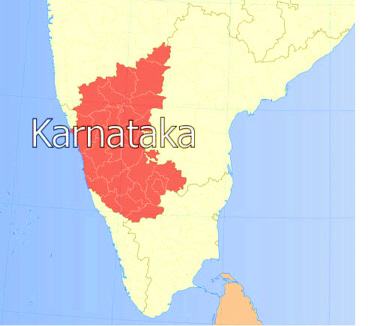
(Bildquelle: PlaneMad/Wikipedia. -- CC-by-sa)

(Bildquelle: PlaneMad/Wikipedia. -- CC-by-sa)
Zitierweise / cite as:
Hodson, Thomas: An elementary grammar of the Kannada, or Canarese language. -- 16. The irregular verbs ಬರು baru, come, and ತರು taru, bring (§ 120). -- Fassung vom 2011-08-25. -- URL: http://www.payer.de/hodson/hodson16.htm
First published as: Hodson, Thomas: An elementary grammar of the Kannada, or Canarese language ; in which every word used in the examples is translated, and the pronunciation is given in English characters. -- 2. ed. -- Bangalore : Wesleyan Mission Press, 1864. -- 128 p. ; 23 cm.
First time published here: 2011-08-25
Revisions:
©opyright: Public domain
This text is part of the section Sanskrit und Indien of Tüpfli's Global Village Library
If you don't get the diacritics displayed, install a Unicode font like Tahoma.
120. The verbs ಬರು baru, come, and ತರು taru, bring, are conjugated as follows. The tenses not given below are formed according to rule.
Root ಬರು baru, come. (See § 297.)
| Past ಭೂತ bhūta |
ಬಂದು baṃdu |
having come | + ದು du |
| Negative ನಿಷೇಧ niṣēdha |
ಬಾರದೆ bārade |
not having come | + ಅದೆ ade |
| Past ಭೂತ bhūta |
ಬಂದ baṃda |
who or which came | Irregular |
| Negative ನಿಷೇಧ niṣēdha |
ಬಾರದ bārada |
who or which comes not, came not, or will not come | + ಅದ ada |
Root + personal affixes.
Come!
| Person ಪುರುಷ puruṣa |
Singular ಎಕವಚನ ekavacana |
Plural ಬಹುವಚನ bahuvacana |
| 2nd. ಮಧ್ಯಮ madhyama |
ಬಾ bā |
ಬನ್ನಿ banni ಬನ್ನಿರಿ |
I come not, came not, or shall not come, &c.
| Person ಪುರುಷ puruṣa |
Singular ಎಕವಚನ ekavacana |
Plural ಬಹುವಚನ bahuvacana |
|
| 1st. ಉತ್ತಮ್ uttama |
ಬಾರೆನು bārenu |
ಬಾರೆವು bārevu |
|
| 2nd. ಮಧ್ಯಮ madhyama |
ಬಾರೆ bāre |
ಬಾರರಿ bārari |
|
| 3rd. ಪ್ರಥಮ prathama |
masculine |
ಬಾರನು bāranu |
ಬಾರರು bāraru |
| feminine |
ಬಾರಳು bāraḷu |
ಬಾರರು bāraru |
|
| neuter |
ಬಾರದು bāradu |
ಬಾರವು bāravu |
I, &c. came
Irregular past relative participle ಬಂದ baṃda + personal affixes.
| Person ಪುರುಷ puruṣa |
Singular ಎಕವಚನ ekavacana |
Plural ಬಹುವಚನ bahuvacana |
|
| 1st. ಉತ್ತಮ್ uttama |
ಬಂದೆನು baṃdenu |
ಬಂದೆವು baṃdevu |
|
| 2nd. ಮಧ್ಯಮ madhyama |
ಬಂದಿ baṃdi |
ಬಂದಿರಿ baṃdiri |
|
| 3rd. ಪ್ರಥಮ prathama |
masculine |
ಬಂದನು baṃdanu |
ಬಂದರು baṃdaru |
| feminine |
ಬಂದಳು baṃdaḷu |
ಬಂದರು baṃdaru |
|
| neuter | ಬಂತು baṃtu |
ಬಂದವು baṃdavu |
I, &c. shall perhaps come.
Irregular past gerund ಬಂದು baṃdu + personal affixes.
| Person ಪುರುಷ puruṣa |
Singular ಎಕವಚನ ekavacana |
Plural ಬಹುವಚನ bahuvacana |
|
| 1st. ಉತ್ತಮ್ uttama |
ಬಂದೇನು baṃdēnu |
ಬಂದೇವು baṃdēvu |
|
| 2nd. ಮಧ್ಯಮ madhyama |
ಬಂದೀಯೆ baṃdīye |
ಬಂದೀರಿ baṃdīri |
|
| 3rd. ಪ್ರಥಮ prathama |
masculine |
ಬಂದಾನು baṃdānu |
ಬಂದಾರು baṃdāru |
| feminine |
ಬಂದಾಳು baṃdāḷu |
ಬಂದಾರು baṃdāru |
|
| neuter |
ಬಂದೀತು baṃdītu |
ಬಂದಾವು baṃdāvu |
To 17. Defective Verbs (§§ 121 - 128)